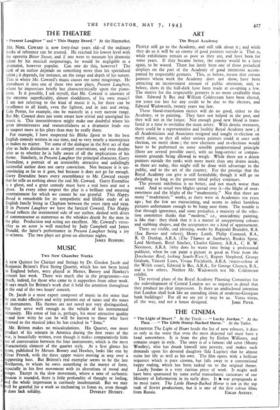M U S I C
Two New Chamber Works
A NEW Quintet for Clarinet and Strings by Dr. Gordon Jacob and Benjamin Britten's First String Quartet, which has not been heard in England before, were played at Messrs. Boosey and Hawkes's concert last week. There was much else in the programme—too much, indeed, for those who came to it supperless from other work. It says much for Britten's work that it held the attention throughout at the end of the two hours' concert.
Dr. Jacob is a most expert composer of music in the sense that he can make effective and witty patterns out of tunes and the tones of instruments. His themes are not novel nor very distinguished, but they serve well enough as the vehicle of his instrumental virtuosity. His sense of fun is, perhaps, his most attractive quality —and how witty he can be will be known to those who have listened to the musical jokes he has cracked in " Itma."
Mr. Britten makes no miscalculations. His Quartet, one more product of his sojourn in America during the first years of the war, is beautifully written, even though it makes comparatively little use of conversation between the four instruments, which is the most characteristic element of the quartet style. At a first glance his score, published by Messrs. Boosey and Hawkes, looks like one by Cesar Franck, with the three upper voices moving in step over a supporting bass. But Britten's real exemplar seems to be the late Beethoven, to whom he owes something in the matter of form, especially in his first movement with its alterations of mood and po. Except in the slow movement, where a note of authentic assion is sounded, there is little profundity of thought or feeling, d the whole impression is curiously insubstantiaL But we may ell be grateful for a work so enchanting to listen to, even though


























 Previous page
Previous page